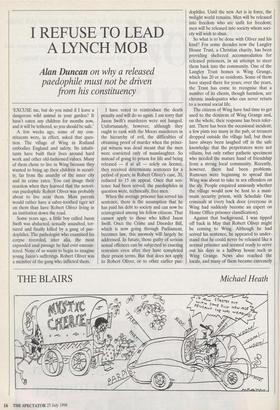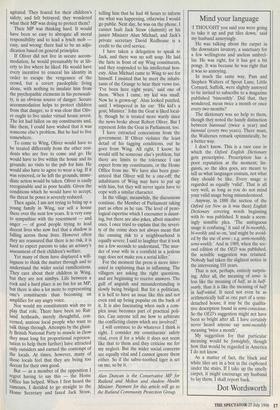I REFUSE TO LEAD A LYNCH MOB
Alan Duncan on why a released
paedophile must not be driven from his constituency
'EXCUSE me, but do you mind if I leave a dangerous wild animal in your garden? It hasn't eaten any children for months now, and it will be tethered, so you should be safe.'
A few weeks ago, some of my con- stituents were, in effect, asked that ques- tion. The village of Wing in Rutland embodies England and safety. Its inhabi- tants have built their lives around hard work and other old-fashioned values. Many of them chose to live in Wing because they Wanted to bring up their children in securi- ty, far from the anarchy of the inner city and its crime rates. You can image their reaction when they learned that the notori- ous paedophile Robert Oliver was probably about to live near them. Most parents would rather have a sabre-toothed tiger set on them than have Robert Oliver living in an institution down the road.
Some years ago, a little boy called Jason Swift was abducted, sexually assaulted, tor- tured and finally killed by a gang of pae- dophiles. The pathologist who examined his corpse recorded, inter afia, the most expanded anal passage he had ever encoun- tered. None of us wants to begin to imagine young Jason's sufferings. Robert Oliver was a member of the gang who inflicted them. I have voted to reintroduce the death penalty and will do so again. I am sorry that Jason Swift's murderers were not hanged. Unfortunately, however, although they ought to rank with the Moors murderers in the hierarchy of evil, the difficulties of obtaining proof of murder when the princi- pal witness was dead meant that the men were convicted only of manslaughter. So instead of going to prison for life and being released — if at all — solely on licence, they received determinate sentences for a period of years; in Robert Oliver's case, 20, reduced to 15 on appeal. Once that sen- tence had been served, the paedophiles in question were, technically, free men.
When the average prisoner has served his sentence, there is the assumption that he has paid his debt to society and can now be reintegrated among his fellow citizens. That cannot apply to those who killed Jason Swift. Once the Crime and Disorder Bill, which is now going through Parliament, becomes law, this anomaly will largely be addressed. In future, those guilty of serious sexual offences can be subjected to exacting restraints even after they have completed their prison terms. But that does not apply to Robert Oliver, or to other earlier pae- dophiles. Until the new Act is in force, the twilight world remains. Men will be released into freedom who are unfit for freedom; men will be released into society whom soci- ety will wish to shun.
So what is to be done with Oliver and his kind? For some decades now the Langley House Trust, a Christian charity, has been providing sheltered accommodation for released prisoners, in an attempt to steer them back into the community. One of the Langley Trust homes is Wing Grange, which has 20 or so residents. Some of them have stayed there for years; over the years, the Trust has come to recognise that a number of its clients, though harmless, are chronic inadequates who can never return to a normal social life.
The citizens of Wing have had time to get used to the denizens of Wing Grange and, on the whole, their response has been toler- ant. There has been the occasional incident; a few pints too many in the pub, or trousers dropped outside the village hall, but these have always been laughed off in the safe knowledge that the perpetrators were not villains, but only rather pathetic specimens who needed the mature hand of friendship from a strong local community. Recently, however, there had been problems. Rumours were beginning to spread that Wing was about to take in sex offenders on the sly. People enquired anxiously whether the village would now be host to a maxi- mum security prison, with Schedule One criminals at every back door (everyone in Wing had suddenly become an expert on Home Office prisoner classification).
Against that background, I was tipped off back in May that Robert Oliver might be coming to Wing. Although he had served his sentence, he appeared to under- stand that he could never be released like a normal prisoner and seemed ready to serve out his days in a halfway house such as Wing Grange. News also reached the locals, and many of them became extremely agitated. They feared for their children's safety, and felt betrayed; they wondered what their MP was doing to protect them?
Their MP was thinking hard. It would have been so easy to abrogate all moral responsibility and to lead a lynch mob — easy, and wrong: there had to be an adju- dication based on general principles.
If Oliver did not live in secure accom- modation, he would presumably be at lib- erty to live where he liked. He would have every incentive to conceal his identity in order to escape the vengeance of the crowd, but a covert paedophile living alone, with nothing to insulate him from the psychopathic elements in his personali- ty, is an obvious source of danger. Secure accommodation helps to protect children from that danger, so it was clear that Oliv- er ought to live under virtual house arrest. The lot had fallen on my constituents and, like them, I could have wished that it was someone else's problem. But he had to live somewhere.
To come to Wing, Oliver would have to be treated differently from the other resi- dents who are free to come and go. He would have to live within the house and its grounds; no visits to the pub for him. He would also have to agree to wear a tag. If it was removed, or he left the grounds, imme- diate action would be taken. Oliver is easily recognisable and in poor health. Given the conditions which he would have to accept, the threat he poses is severely reduced.
Then again, I am not trying to bring up a young family in Wing, nor sell a house there over the next few years. It is very easy to sympathise with the resentment — and anger — of good people trying to lead decent lives who now feel that a shadow is falling across those lives. However often they are reassured that there is no risk, it is hard to expect parents to take an actuary's assessment of their children's welfare.
Yet many of them have displayed a will- ingness to think the matter through and to understand the wider social ramifications. They care about their children in Wing, but they are not nimbys. Life between a • rock and a hard place is no fun for an MP, but there is also a lot more to representing one's constituents than becoming an amplifier for any angry voice. Nor would my constitutents wish me to play that role. There have been no Rut- land hotheads, merely thoughtful, con- cerned, anxious local people who want to talk things through. Attempts by the ghast- ly British National Party to muscle in (how they must long for proportional represen- tation to help them further) have attracted Only outsiders and earned the contempt of the locals. At times, however, many of those locals feel that they are being too decent for their own good. But — as a member of the opposition I regret having to say this — the Home Office has helped. When I first heard the rumours, I decided to go straight to the Home Secretary and faxed Jack Straw, telling him that he had 48 hours to inform me what was happening, otherwise I would go public. Next day, he was on the phone. I cannot fault Jack Straw (dammit) or his junior Minister Alun Michael, and Jack's private secretary David Redhouse is a credit to the civil service.
I have taken a delegation to speak to Jack, and there was no soft soap. He laid the facts in front of my Wing constituents, and they responded to his intellectual hon- esty. Alun Michael came to Wing to see for himself. I insisted that he meet the inhabi- tants of the Grange to hear their views too. 'I've been here eight years,' said one of them. 'When I came, my kid was small. Now he is grown-up'. Alun looked puzzled, until I whispered in his ear: 'His kid's a goat, Minister.' John the Goat is liked local- ly, though he is treated more warily since the news broke about Robert Oliver. But I represent John the Goat in Parliament, too.
I have extracted concessions from the government. If Oliver violates the least detail of his tagging conditions, out he goes from Wing. All right, I know; he would still be someone else's problem, but there are limits to the tolerance I can expect from my constituents, or the Home Office from me. We have also been guar- anteed that Oliver will be a one-off; the inhabitants of Wing may have to put up with him, but they will never again have to cope with a similar character.
In the village, meanwhile, the discussions continue, the Member of Parliament taking part as often as he can. The level of peno- logical expertise which I encounter is daunt- ing, but there are also jokes, albeit macabre ones. I once tried to explain that the severi- ty of the crime does not always mean that the ensuing risk to a neighbourhood is equally severe. I said to laughter that it took me a few seconds to understand, 'The mur- der of your wife in a cornfield in a jealous rage does not make you a serial killer.'
For the moment the press is more inter- ested in explaining than in inflaming. The villagers are asking the right questions, and are beginning to receive answers. The gulf of anguish and misunderstanding is slowly being bridged. But for a politician, it is hell to have an issue like this and not even end up being popular on the back of it. It is also fascinating when such a com- plex issue becomes part of practical poli- tics. Can anyone tell me how to arbitrate the conflicting claims which are involved?
I will continue to do whatever I think is right. I consider my constituents' safety vital, even if for a while it does not seem like that to them and they criticise me for my neglect. But the wider social concerns are equally vital and I cannot ignore them either. So if the sabre-toothed tiger is set on me, so be it.
Alan Duncan is the Conservative MP for Rutland and Melton and shadow Health Minister. Payment for this article will go to the Rutland Community Protection Group.



























































 Previous page
Previous page